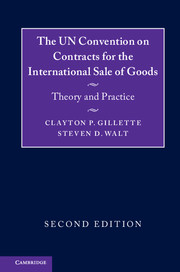Book contents
- Frontmatter
- Contents
- Preface
- 1 The CISG: history, methodology, and construction
- 2 The scope of the CISG
- 3 Contract formation
- 4 Implied terms and interpretation
- 5 Performance
- 6 Liability for nonconformity
- 7 Risk of loss
- 8 Exemption from performance
- 9 Remedies
- Appendix 1 The United Nations Convention on Contracts for the International Sale of Goods
- Appendix 2 CISG status table
- Table of cases
- Subject matter index
4 - Implied terms and interpretation
Published online by Cambridge University Press: 05 June 2016
- Frontmatter
- Contents
- Preface
- 1 The CISG: history, methodology, and construction
- 2 The scope of the CISG
- 3 Contract formation
- 4 Implied terms and interpretation
- 5 Performance
- 6 Liability for nonconformity
- 7 Risk of loss
- 8 Exemption from performance
- 9 Remedies
- Appendix 1 The United Nations Convention on Contracts for the International Sale of Goods
- Appendix 2 CISG status table
- Table of cases
- Subject matter index
Summary
Sales contracts do not specify the obligations of the parties for every possible contingency that might arise during the contract's performance. Writing a completely specified contract for even a relatively simple commercial transaction is impossible and, even if feasible, not cost-justified for the parties. Parties prefer to invest only optimally in drafting, because further investment reduces the net value of the contract. Because some contingencies are so remote that dealing with them explicitly is not worthwhile, the contract will necessarily contain gaps. Implied terms that reflect party preferences also reduce transactions costs because their existence avoids the need to supply an express term covering the same matter. Parties may also prefer implied terms to fill gaps that arise when parties believe that an attempt to fill them sends an adverse signal to the counterparty about their own quality as a contracting partner. For example, requesting an explicit damage limitation term may indicate to the counterparty that the requesting party expects to breach. The CISG supplies implied terms, including trade usage, course of dealing, and course of performance, that address some of the contingencies about which the parties leave the contract silent. The circumstances in which the CISG implies a price term and a duty of good faith are less clear and more controversial.
Implied terms apply to the contract only if it contains gaps. If the contract's express terms deal with the matter, they govern and there is no gap to be filled by an implied term. Thus, in order to determine whether implied terms apply to the contract, the contract's express terms first must be determined and interpreted. Some domestic rules, such as the parol evidence rule, control the sort of evidence a court can consider in interpreting the terms of the contract. For their part, Articles 8 and 11 prescribe the evidence a tribunal must take into account to interpret the contract's terms. The CISG is unclear as to whether (or the extent to which) the parol evidence rule applies to the interpretation of contracts governed by the CISG, although most courts have concluded that the CISG excludes the rule. This chapter describes the CISG's treatment of important implied terms and interpretation of the contract.
- Type
- Chapter
- Information
- The UN Convention on Contracts for the International Sale of GoodsTheory and Practice, pp. 119 - 154Publisher: Cambridge University PressPrint publication year: 2016



